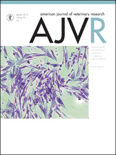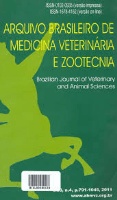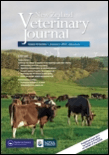
Thai Journal of Veterinary Medicine
Scope & Guideline
Empowering practitioners with cutting-edge veterinary insights.
Introduction
Aims and Scopes
- Veterinary Clinical Research:
The journal publishes studies related to clinical diagnostics, treatment strategies, and management of diseases in companion and farm animals, highlighting advancements in surgical techniques and medical therapies. - Animal Reproduction and Breeding:
Research on reproductive technologies, including in vitro fertilization, hormonal treatments, and breeding management, is a core focus, promoting better reproductive outcomes in various species. - Zoonotic Diseases and Public Health:
The journal addresses issues related to zoonotic pathogens, their transmission from animals to humans, and implications for public health, emphasizing the importance of surveillance and control measures. - Animal Nutrition and Feed Technology:
Studies on the nutritional requirements of different species and the development of feed additives or supplements to enhance growth, health, and productivity in livestock are emphasized. - Microbiology and Pathology:
The journal features research on the microbiological aspects of animal health, including the characterization of pathogens, antimicrobial resistance, and the pathology of infectious diseases. - Veterinary Education and Training:
Research focusing on veterinary education, training methodologies, and the ethical considerations in veterinary practice is also an important area of publication.
Trending and Emerging
- Antimicrobial Resistance:
There is a growing focus on studies addressing antimicrobial resistance in veterinary medicine, reflecting global health concerns and the need for sustainable practices in animal treatment. - Innovative Diagnostic Techniques:
Emerging themes include the development and application of novel diagnostic tools and technologies, such as molecular methods and imaging techniques to improve disease detection and management. - Animal Welfare and Ethics:
Research on animal welfare, ethical considerations in veterinary practice, and the psychological well-being of animals is gaining ground, indicating a shift towards more humane and ethical veterinary practices. - One Health Approach:
The integration of human, animal, and environmental health within a One Health framework is becoming increasingly prominent, as researchers explore the interconnectedness of health issues across species. - Nutritional Genomics:
The exploration of nutritional genomics and its impact on animal health and productivity is on the rise, as veterinarians and researchers seek to optimize diets based on genetic and metabolic profiles.
Declining or Waning
- Traditional Animal Husbandry Practices:
Research focused on conventional animal husbandry practices has decreased, possibly due to a growing emphasis on modern techniques and technologies in animal production and welfare. - Basic Anatomy Studies:
Basic anatomical studies have waned, as the journal shifts towards more applied research that has immediate clinical or practical relevance, reflecting the needs of practitioners. - Veterinary Parasitology:
While still relevant, studies specifically focused on veterinary parasitology have seen a decline in frequency, likely overshadowed by broader themes of infectious disease and antimicrobial resistance. - Historical Veterinary Practices:
Research exploring historical perspectives or traditional veterinary practices has diminished, as contemporary approaches and evidence-based practices take precedence.
Similar Journals

ACTA VETERINARIA BRNO
Fostering Excellence in Veterinary Research and PracticeACTA VETERINARIA BRNO is a distinguished journal published by the Veterinární a farmaceutická univerzita Brno in the Czech Republic, focusing on innovative and scholarly research in the field of veterinary sciences. With an established history dating back to 1974, this journal has evolved to maintain its relevance in contemporary veterinary research, as evidenced by its inclusion in Scopus and a respectable Q3 rank in the miscellaneous veterinary category. Despite operating under traditional access models, ACTA VETERINARIA BRNO remains a vital resource for researchers and practitioners seeking to advance their understanding of veterinary medicine and related disciplines. With its commitment to publishing high-quality, peer-reviewed articles, the journal serves as a crucial platform for disseminating significant findings, thereby contributing to the enhancement of animal health and welfare globally.

Journal of the Hellenic Veterinary Medical Society
Championing excellence in veterinary medicine since 1953.Welcome to the Journal of the Hellenic Veterinary Medical Society, a premier platform dedicated to advancing the field of veterinary medicine through high-quality research and scholarly discourse. Published by the Hellenic Veterinary Medical Society, this journal serves as a vital resource for veterinarians, researchers, and students who are committed to the advancement of animal health and welfare. With an ISSN of 1792-2720 and a recognized status in the community, the journal publishes impactful studies that contribute to the understanding of various veterinary disciplines. Although the journal currently sits in Q3 of the Veterinary (miscellaneous) category with a Scopus ranking of #157/194, it aims to elevate its reach and impact within the scientific community, fostering a culture of innovation and knowledge sharing. The journal strictly adheres to open access principles, ensuring that its findings are readily available to all, thereby promoting collaboration and comprehensive learning. By participating in this esteemed journal, authors and researchers contribute to the rich history and ongoing dialogue of veterinary science that dates back to its founding in 1953. We invite you to explore, engage, and contribute to the growing body of knowledge in veterinary medicine.

ACTA VETERINARIA SCANDINAVICA
Bridging gaps in veterinary science and practice.ACTA VETERINARIA SCANDINAVICA is a prestigious open-access journal dedicated to advancing the field of veterinary science and promoting interdisciplinary research. Published by BMC since 2001, this journal has become a vital resource for veterinarians, researchers, and students worldwide, with an ISSN of 0044-605X and an E-ISSN of 1751-0147. With a remarkable impact factor reflecting its relevance—ranking in the Q2 quartile for Veterinary (miscellaneous) and Q3 for Medicine (miscellaneous)—ACTA VETERINARIA SCANDINAVICA focuses on a broad spectrum of veterinary topics, ensuring that critical research is available to the academic community and beyond. Located in the United Kingdom, this journal has successfully converged its publishing efforts from 1960 to 2024, highlighting its long-standing commitment to veterinary excellence. Researchers are encouraged to submit their work through the journal’s user-friendly platform, contributing to the ever-evolving landscape of animal health and welfare.

AMERICAN JOURNAL OF VETERINARY RESEARCH
Pioneering Research for a Healthier Animal FutureAmerican Journal of Veterinary Research, published by the American Veterinary Medical Association, serves as a cornerstone of the veterinary medical community, providing essential insights from 1945 to the present. With an ISSN of 0002-9645 and E-ISSN of 1943-5681, this esteemed journal focuses on a diverse range of topics within the veterinary field, contributing to the advancement of veterinary science through rigorous peer-reviewed research. Ranking in the Q2 category in Veterinary (miscellaneous) and Q3 in Medicine (miscellaneous) category as of 2023, it holds a respectable position in Scopus rankings, further emphasizing its impact in the field. While currently not an Open Access journal, its objective remains clear: to disseminate cutting-edge research that informs clinical practice and enhances animal health and welfare. The American Journal of Veterinary Research is invaluable for researchers, professionals, and students seeking to stay at the forefront of veterinary advancements and innovations.

ARQUIVO BRASILEIRO DE MEDICINA VETERINARIA E ZOOTECNIA
Advancing veterinary science through open access.ARQUIVO BRASILEIRO DE MEDICINA VETERINARIA E ZOOTECNIA, an esteemed publication in the field of veterinary medicine and animal science, has been a vital resource for researchers and professionals since its inception in 1996. Published by the ARQUIVO BRASILEIRO MEDICINA VETERINARIA ZOOTECNIA, this journal is recognized for its open-access model, allowing widespread dissemination of knowledge since 1999. With a 2023 Scopus ranking placing it in the 25th percentile within the veterinary field, ARQUIVO BRASILEIRO is categorized in Q3 in Veterinary (miscellaneous), highlighting its commitment to scholarly excellence. The journal's scope encompasses a diverse range of topics related to veterinary medicine and zootechnics, making it a crucial platform for advancing research and professional practice. Situated in Belo Horizonte, Minas Gerais, Brazil, it serves not only the local community but also an international audience, fostering collaboration and innovation in veterinary sciences. As such, ARQUIVO BRASILEIRO is an invaluable asset for students, researchers, and practitioners looking to stay at the forefront of veterinary research.

JAPANESE JOURNAL OF VETERINARY RESEARCH
Elevating animal health with cutting-edge discoveries.The Japanese Journal of Veterinary Research, published by Hokkaido University, is a pivotal resource in the field of veterinary science, focusing on a wide array of topics that contribute to the advancement of veterinary research. Established in 1965, this esteemed journal has been at the forefront of disseminating innovative research findings and methodologies crucial for animal health and welfare in Japan and beyond. With an ISSN of 0047-1917 and recognized in the Q3 quartile of veterinary journals, it serves as a significant platform for both established researchers and emerging scholars, fostering a collaborative environment that aims to elevate veterinary practice. Although it operates under a traditional subscription model without open access, the journal's selectivity and rigorous peer-review process enhance the quality of published works, attracting attention from global audiences. Based in Sapporo, Japan, the journal continually strives to provide a vital forum for discussions that shape the future of the veterinary profession.

Slovenian Veterinary Research
Pioneering Research for a Healthier Animal WorldSlovenian Veterinary Research, published by the University of Ljubljana, serves as a significant platform for the dissemination of research within the veterinary field. With an ISSN of 1580-4003 and an E-ISSN of 2385-8761, this open-access journal has made its content freely available to the global research community since 2021, enhancing accessibility and engagement. The journal's scope includes a diverse range of topics relevant to veterinary science, aiming to foster innovation and collaboration among researchers, professionals, and students in the field. Although currently categorized in the Q4 quartile for veterinary studies, the journal is committed to improving its impact and visibility, particularly as it converges on its upcoming years of operation from 2007 to 2024. As it strives to elevate its Scopus ranks, currently positioned at rank #162/194 in General Veterinary, Slovenian Veterinary Research provides a vital resource for advancing knowledge and best practices in veterinary medicine. For anyone interested in the latest veterinary research trends and findings emanating from Slovenia and beyond, this journal represents an essential source of information.

BERLINER UND MUNCHENER TIERARZTLICHE WOCHENSCHRIFT
Connecting Professionals through Veterinary ExcellenceBERLINER UND MUNCHENER TIERARZTLICHE WOCHENSCHRIFT is an esteemed journal in the fields of Veterinary Science and Medicine, published by SCHLUETERSCHE VERLAGSGESELLSCHAFT MBH & CO KG. Since its inception in 1946, this journal has served as a vital platform for advancing knowledge and research in veterinary medicine within Germany and beyond. With a current impact factor that places it in the Q4 category in both Medicine and Veterinary, it continues to provide significant insights for professionals, researchers, and students engaged in the veterinary community. Although it is not an Open Access journal, its rich content contributes to the foundational literature of the field, making it an essential reference. Researchers looking to publish their findings or keep informed on the latest advancements in veterinary and medical practices will find this journal an invaluable resource. It is headquartered in Hannover, Germany, and serves as a testament to the ongoing dedication to veterinary research since the mid-20th century.

Acta Veterinaria Eurasia
Innovating animal welfare through open access research.Acta Veterinaria Eurasia is a prominent open access journal dedicated to advancing the field of veterinary sciences. Published by AVES since 2002, it aims to provide a platform for innovative research and insights that enhance veterinary practices and animal welfare. With its ISSN 2618-639X and E-ISSN 2619-905X, the journal has established a growing international reputation, particularly in Turkey, and is indexed in major databases. As of 2023, it is positioned in Q4 of the Veterinary (miscellaneous) category and holds a Scopus rank of #138 out of 194 in the general veterinary domain, placing it in the 29th percentile. The journal spans a broad scope within veterinary studies, inviting contributions that foster knowledge dissemination and collaboration among researchers, professionals, and students alike. By promoting open access since its inception, Acta Veterinaria Eurasia is committed to making cutting-edge research accessible to all, ultimately supporting improved health outcomes in veterinary practice.

NEW ZEALAND VETERINARY JOURNAL
Exploring the forefront of animal welfare and medicine.NEW ZEALAND VETERINARY JOURNAL, published by Taylor & Francis Ltd, stands as a pivotal platform in the realm of veterinary science, contributing significantly to the global discourse on animal health and welfare since its inception in 1952. With an ISSN of 0048-0169 and an E-ISSN of 1176-0710, this journal offers invaluable insights within both the veterinary and general medical fields, currently achieving a commendable Q2 ranking in Veterinary (miscellaneous) and Q3 in Medicine (miscellaneous) for 2023. Its Scopus ranking places it in the 76th percentile among veterinary journals, affirming its high-impact presence in academia. While access to this journal is not open, it maintains an essential role for researchers, professionals, and students aiming to advance their knowledge and contribute to the field of veterinary science. With a commitment to disseminating quality research, NEW ZEALAND VETERINARY JOURNAL enriches the understanding of veterinary practices and enhances ongoing dialogue on critical health issues affecting animals, promoting better outcomes through scientific inquiry.